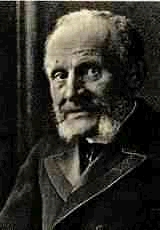Nikolay Girs

Nicholas de Giers or Girs (Russian: Никола́й Ка́рлович Гирс Nikolay Karlovich Girs) (21 May [O.S. 9 May] 1820 – 26 January [O.S. 14 January] 1895) was a Russian Foreign Minister during the reign of Alexander III. He was one of the architects of the Franco-Russian Alliance, which was later transformed into the Triple Entente.
Biography
Girs's family was of Scandinavian ancestry. Like his predecessor, Prince Gorchakov, he was educated at the Tsarskoye Selo Lyceum, near St Petersburg, but his career was much less rapid, because he had no influential protectors, and was handicapped by being a Protestant of Teutonic origin. At the age of eighteen, he entered the service of the Eastern department of the ministry of foreign affairs, and spent more than twenty years in subordinate posts, chiefly in south-eastern Europe, until he was promoted in 1863 to the post of minister plenipotentiary in Persia. Here he remained for six years, and, after serving as a minister in Switzerland and Sweden, he was appointed in 1875 director of the Eastern department and assistant minister for foreign affairs under Prince Gorchakov, whose niece he had married.[1]
On the death of Alexander II in 1881 it was generally expected that Girs would be dismissed as deficient in Russian nationalist feeling, for Alexander III was credited with strong anti-German Slavophile tendencies. In reality, the young tsar did not intend to embark on wild political adventures, and was fully determined not to let his hand be forced by men less cautious than himself. What he wanted was a minister of foreign affairs who would be at once vigilant and prudent, active and obedient, and who would relieve him from the trouble and worry of routine work while allowing him to control the main lines, and occasionally the details, of the national policy. Girs was exactly what he wanted, and accordingly the tsar not only appointed him minister of foreign affairs on the retirement of Prince Gorchakov in 1882, but retained him to the end of his reign in 1894.[1]
In accordance with the desire of the tsar Girs followed systematically a pacific policy. Accepting as a fait accompli the existence of the Triple Alliance, created by Bismarck for the purpose of resisting any aggressive action on the part of Russia and France, he sought to establish more friendly relations with the cabinets of Berlin, Vienna and Rome. To the advances of the French government, he at first turned a deaf ear, but when the rapprochement between the two countries was effected with little or no co-operation on his part, he utilized it for restraining France and promoting Russian interests.[1]
Rivalry between Britain and Russia grew steadily over Central Asia in the Great Game of the late 19th century. Russia desired warm-water ports on the Indian Ocean while Britain wanted to prevent Russian troops from gaining a potential invasion route to India. [2] In 1885 Russia annexed part of Afghanistan in the Pandjeh Incident, which caused a war scare. However Girs and the Russian ambassador to London Baron de Staal set up an agreement in 1887 which established a buffer zone in Central Asia. Russian diplomacy won grudging British acceptance of its expansionism.[3] Persia was also an arena of tension, but without warfare. [4]
He died on 26 January 1895, soon after the accession of Nicholas II.[1] His son Mikhail Nikolayevich von Giers acted as last Imperial Russian Ambassador in Constantinople until the beginning of World War I in 1914.

There were many high ranked 'von Giers' in Russian government, among them President in Podolien and minister Fredrik von Giers (1776 in St. Petersburg, 1842), minister Karl Ferdinand von Giers (1777, 1835), minister Konstatin von Giers (1777, 1835), Ambassador Nikolaus von Giers (1853, 1924), Ambassador Mikail von Giers (1856, 1932), Admiral Theodor von Giers (1835, 1905) etc. And some of these Giers relatives were married to other high ranked Russian families, among them general Komaroff, the Princess Olga Cantacuszene and general Karl de Meyer.
Notes
- ^ a b c d One or more of the preceding sentences incorporates text from a publication now in the public domain: Wallace, Donald Mackenzie (1911). "Giers, Nicholas Karlovich de". In Chisholm, Hugh (ed.). Encyclopædia Britannica. Vol. 12 (11th ed.). Cambridge University Press. pp. 2–3.
- ^ David Fromkin, "The Great Game in Asia," Foreign Affairs(1980) 58#4 pp. 936-951 in JSTOR
- ^ Raymond Mohl, "Confrontation in Central Asia" History Today 19 (1969) 176-183
- ^ Firuz Kazemzadeh, Russia and Britain in Persia, 1864-1914: A Study in Imperialism (Yale UP, 1968).
External links
